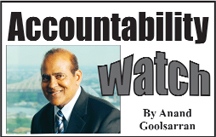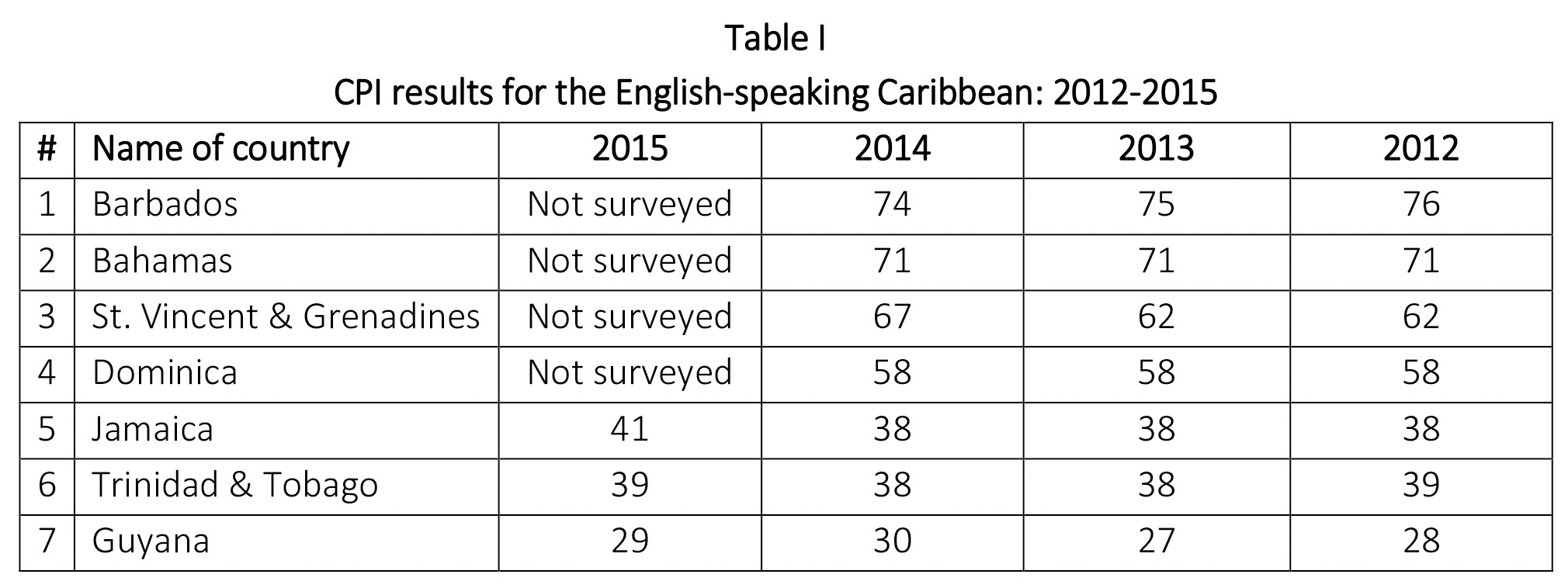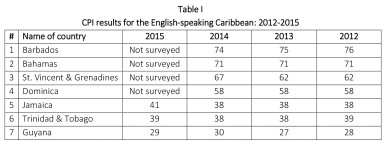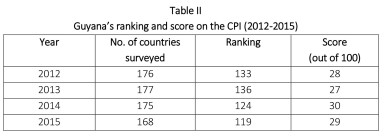Corruption has disastrous impacts on development when funds that should be devoted to schools, health clinics and other vital public services are instead diverted into the hands of criminals or dishonest officials.
Corruption exacerbates violence and insecurity. It can lead to dissatisfaction with public institutions, disillusion with government in general, and spirals of anger and unrest.
Ban Ki-moon, Secretary-General of the United Nations
The above quotation was part of the message from Secretary-General of the United Nations to mark the 2015 International Anti-Corruption Day which was observed on 9 December 2015. Readers will recall that the United Nations Convention against Corruption (UNCAC) came into being on this same day, 12 years ago. Guyana acceded to the Convention five years later on 16 April 2008. According to Kofi Annan, former United Nations Secretary General, if the Convention is fully enforced, it can make a real difference to the quality of life of millions of people around the world, and by removing one of the biggest obstacles to development it can help us achieve the Millennium Development Goals. He gave the assurance that the United Nations would do whatever it could to “support the efforts of States to eliminate the scourge of corruption from the face of the Earth. It is a big challenge, but I think that, together, we can make a difference”.
 On 27 January 2016, Transparency International (TI) released the results of the Corruption Perceptions Index (CPI) for 2015. According to the release, the results showed that people working together can succeed in the battle against corruption, and that although corruption is still rife globally, more countries improved their scores than declined. However, two-thirds of the 168 countries surveyed still scored below 50 out of 100. In a brief comment accompanying the release, Chair of Transparency International, José Ugaz stated that “Corruption can be beaten if we work together. To stamp out the abuse of power, bribery and shed light on secret deals, citizens must together tell their governments they have had enough. The 2015 Corruption Perceptions Index clearly shows that corruption remains a blight around the world. But 2015 was also a year when people again took to the streets to protest corruption. People across the globe sent a strong signal to those in power: it is time to tackle grand corruption”. TI is calling on all people to take action by voting at unmaskthecorrupt.org in order to identify cases that merit urgent attention.
On 27 January 2016, Transparency International (TI) released the results of the Corruption Perceptions Index (CPI) for 2015. According to the release, the results showed that people working together can succeed in the battle against corruption, and that although corruption is still rife globally, more countries improved their scores than declined. However, two-thirds of the 168 countries surveyed still scored below 50 out of 100. In a brief comment accompanying the release, Chair of Transparency International, José Ugaz stated that “Corruption can be beaten if we work together. To stamp out the abuse of power, bribery and shed light on secret deals, citizens must together tell their governments they have had enough. The 2015 Corruption Perceptions Index clearly shows that corruption remains a blight around the world. But 2015 was also a year when people again took to the streets to protest corruption. People across the globe sent a strong signal to those in power: it is time to tackle grand corruption”. TI is calling on all people to take action by voting at unmaskthecorrupt.org in order to identify cases that merit urgent attention.
Corruption is defined as the abuse or misuse of public power for private gain, and in so doing, the public interest is sacrificed in favour of private interest. Grand corruption is “the abuse of high-level power that benefits the few at the expense of the many, and causes serious and widespread harm to individuals and society. It often goes unpunished”. Corruption invariably benefits those in positions of authority some of whom, by their very actions, show little or no consideration of the public good and the public interest. It also benefits the rich and powerful with strong political connections, at the expense of the poor, the unemployed, and the disadvantaged youths, women and children. The latter are deprived of the much-needed resources of the State to enable them to lift themselves out of poverty and to provide them with meaningful opportunities for themselves and their families and to contribute to the affairs of the State. It is estimated that more than six billion people, or nine out of every ten persons, live in countries where corruption is a serious problem.
Given the opaque nature of corruption, it is not possible to measure actual levels of corruption in a country. It was for this reason that the CPI was developed in 1995 to measure perceived levels of corruption in the public sector. The CPI is calculated based on surveys carried out of the perceptions of knowledgeable people, such as senior businessmen and political country analysts, about perceived levels of corruption. For the 2015 CPI, twelve data sources were used, including the Economist Intelligence Unit, the World Bank and the World Economic Forum.
Most of the countries surveyed regard the CPI as an authoritative pronouncement of the best substitute measure for actual levels of corruption. Those who share a deep concern for good governance, transparency and accountability view the index as an important measure in any fight against corruption. An improvement in the CPI ranking and score is an indicator of a reduction in the level of corruption. The first step, however, is for a country to accept in good faith the CPI ranking and score; recognize that corruption exists and the extent to which it is perceived to be so; and take appropriate measures to bring about an improvement in its ranking and score.
Overall 2015 CPI results
The top ten countries in the 2015 CPI survey (in descending order) are: Denmark (91), Finland (90), Sweden (89), New Zealand (87), Norway (87), Netherlands (87), Switzerland (86), Singapore (86), Canada (83) and Germany (81). According to TI, these countries share a number of important characteristics: high levels of press freedom; access to budget information so the public knows where money comes from and how it is spent; high levels of integrity among people in power; and judiciaries that do not differentiate between rich and poor, and are truly independent from other parts of government. On the other hand, the ten countries perceived to be the most corrupt (in descending order) are: Somalia (8), North Korea (8), Afghanistan (11), Sudan (12), South Sudan (15), Angola (15), Libya (16), Iraq (16), Venezuela (17) and Guinea-Bissau (17). They share the following common characteristics: poor governance; weak public institutions e.g. the police and the judiciary; and a lack of independence in the media. Five of these countries have been ravaged by conflict and war. TI estimates that poor countries lose US$1 trillion every year through corruption.
It is indeed unfortunate that countries with little economic and other resources are the ones tainted most with high levels of corruption. For example, the daughter of Angola’s President is reported to have amassed US$3.4 billion in wealth at a time when 70% of the country’s population live on US$2 a day or less, and child mortality rate in the country is the highest in the world. Another example is that of the former President of Ukraine who lived in a multi-million-dollar mansion and under whose presidency, millions of State assets found their way into private hands. The former President fled to Russia and is now wanted by Ukraine on embezzlement charges. It is the sacred and solemn duty of every government to protect the national patrimony and the integrity of the State, and not to superintendent over their liquidation into the hands of private individuals!
In our neighbouring country Brazil, the state-owned oil company, PETROBRAS was reportedly ensnared in a corruption scandal involving politicians taking kickbacks in exchange for the award of contracts. As the economic situation worsened in the country, tens of thousands of workers lost their jobs, and over one million people took to the streets in protest.
2015 CPI results for the English-speaking Caribbean
For 2015, only three countries in the English-speaking Caribbean were surveyed: Jamaica (41), Trinidad & Tobago (39) and Guyana (29), compared with seven in the previous year. Table I shows the results for the seven countries for the last three years.
As can be noted, Jamaica and Trinidad & Tobago improved their standing on the CPI by three points and one point respectively. On the other hand, Guyana continues to perform poorly with a score of 29, a decrease of one point. While Guyana’s ranking has improved from 124 to 119, the number of countries surveyed was reduced from 175 to 168 of which four are from the Caribbean. These countries had superior scores in previous years, compared with Guyana. Had they been included in the 2015 CPI survey, Guyana’s ranking would have been 123. In addition, three other countries – Azerbaijan, Russia and Sierra Leone – shared the 119th place with Guyana. These factors would suggest that Guyana’s ranking did not really improve. Table II shows the country’s ranking and score for the last three years:
As regards Guyana’s one-point reduction in score, it should be borne in mind that 2015 straddles two Administrations. The CPI survey is usually carried out in August-September of every year. For 2014, the CPI score would not have reflected the prorogation of Parliament on 10 November 2014; the incurrence of expenditure of $4.544 billion without parliamentary approval; and the Chief Justice’s subsequent ruling of a serious constitutional violation in relation to the said expenditure. These three occurrences would have impacted negatively on the 2015 CPI. The fact, however, that Guyana’s score declined by a mere one point would suggest that there were mitigating or ameliorating factors arising from a change in government and some of the early actions the new Administration had taken. These include the passing of the 2015 budget, the commissioning of a number of forensic audits, the amendments to the Anti-Money Laundering and Countering Financing of Terrorism Act; and the announcement of the holding of local government elections.
A number of other reform initiatives have since been undertaken but it will take time for the effects to be felt to cause a positive impact on Guyana’s CPI. Over the years, Jamaica has made tremendous strides aimed at fighting corruption. However, for three consecutive years, its CPI score remained at 38. It was not until 2015 that Jamaica was able to improve its score by three points. It would indeed be a long haul for Guyana to see any significant improvement in its CPI standing.








